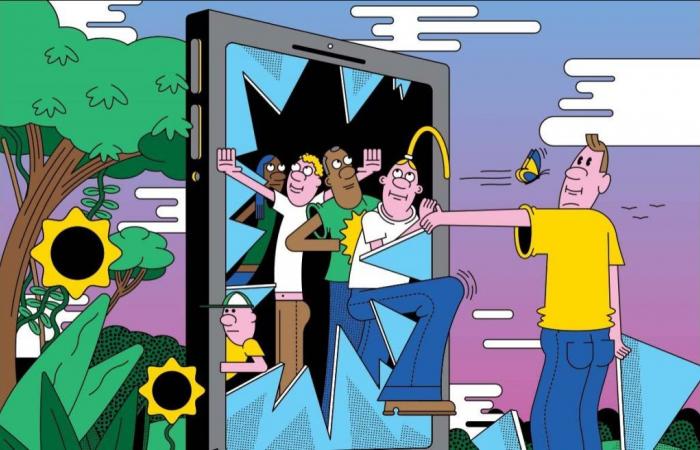“Vdrunk without downtime », demanded a joyful slogan from May-68. It seems we are there. We no longer daydream on transport or in queues. With the widespread use of smartphones, the share of people browsing the Internet at the slightest hesitation has jumped 40 points in 10 years to reach 70%, according to the Digital Barometer1. Half of respondents say they watch videos or play video games while waiting, while reading on paper, talking or observing decreases. According to another study carried out among 21,000 people2, a third of respondents use their smartphone at the table and even in the toilet. And it is now possible to buy waterproof covers to continue watching a series episode in the shower.
Article from our issue 64 “Can we escape digital influence? “. On newsstands, bookstores and in our store.
Information fatigue, “ binge watching “, ” doom scrolling »3… Social networks, apps, games and series devour our available brain time. So much so that the frenzy of connection has become a source of discomfort: 4 out of 10 people judge, according to the study already cited, that they spend too much time there (57% among adults under 40) . And 39% try unsuccessfully to break away from it. The “threshold of harmfulness” of the smartphone, to use the words of Ivan Illich in Friendliness (1973), seems to have been achieved: “ Past a certain threshold, the servant tool becomes a despot.“.
Long consensual, this invasion of everyday life now raises widespread concern. But collective hypnosis is often reduced in public debates to a problem of “addiction”, mainly affecting children. However, hyperconnection is not a deviance: it is the very heart of the platforms’ economic model.
The era of attentional extractivism
According to the philosopher Yves Citton, it is imperative to “ consider attention as an essentially collective phenomenon: “I” am only attentive to what we collectively pay attention to“. A selective principle with multiple modes – vigilance, floating attention, concentration – our individual attention is shaped by the sensitivity and demands of the time, the collective settings (class, theater, assembly line work, etc.) and the media environments in which we bathe in. However, continues Yves Citton, in his reference work For an ecology of attention(Seuil, 2014), it is essential “ to measure the extent to which the modes of production and subjectification established by contemporary capitalism deeply condition the functioning as well as the objects of our attention. »
The commodification of human attention emerged in the 19the century with the mass press. In Paris in 1836, street criers sell daily newspapersThe centuryAnd The Press for half the price of their competitors. The secret of these titles? Supplement their revenues by selling advertising inserts. The founder of The Press, Émile de Girardin, formalized at the time the law of the “double market”: newspapers compete both to attract the attention of the public and the interest of advertisers, success on the first market conditioning success on the second. And the model of sensational journalism, leafing through news items and the lives of celebrities, soon made the fortune of certain titles like The small newspaperwhich sold a million copies in 1890.
A century later, the influence of market logic on the media environment is entering a new phase in France, with the rise of media entirely financed by advertising. Long a state monopoly, the “small screen” experienced a real upheaval at the end of the 1980s, in the midst of a neoliberal shift. After the creation of the first two private channels, La Cinq and TV6, the right-wing government of Jacques Chirac sold the main French channel, TF1, to the Bouygues group in 1986. These companies are transforming the audiovisual landscape, by calibrating their broadcasts, including news, according to a single criterion: the audience, which defines the selling price of advertising spots. A reality that TF1 CEO Patrick Le Lay crudely expressed in 2004 in an interview that caused a scandal: “ What we are selling to Coca-Cola is spare human brain time. »
The art of capturing “human brain time” has today entered an unprecedented phase that Yves Citton describes as “attentional extractivism“. YouTube, Facebook, Instagram, attention. Because ” the commodification of attention has become the prevalent mode of financing in our communication systems» ( Blind spots of ubiquitous digital, Presses du Réel, 2023). To the point of considering, as the social network TikTok Lite did, rewarding in the form of Amazon vouchers the massive viewing of videos suggested by the algorithm. A system, suspended in April 2024, after the European Commission threatened to sanction the group due to the “risk of addiction” for users.
When digital becomes a screen
If we are so “addicted” to our smartphones, it is also because the actors of technocapitalism have seized, with their attractive free solutions, the very fabric of our relationships. To the point of making the connected phone a “torrid” object in the eyes of Yves Citton, condensing all of our social affections. “From distant news of a disaster or stock market fluctuation to the cry for help from an overworked colleague or a sick child, to the expected response to a job application or the message dangling the possibility of a sexual encounter, the screen of our cell phones condenses […] all the stimulations that connect us to our fellow human beings.»
Long unshakeable, the consensus on the benefits of the digitalization of the world today seems to be crumbling. Technocritical discourses are gradually emerging from the margins in France.
This hyperconnection, however, paradoxically contributes to degrading the quality of our exchanges. Like when a face-to-face conversation is interrupted by a notification, or the compulsive need of the interlocutor to monitor their networks. Beyond this phenomenon of “technoference” (technological interference), the influence of digital services alters links in a more insidious way, according to Alain Damasio. “As it has been developed, consumer tech, that of the smartphone and networks, is first and foremost a social machine to expand our egocenters», summarizes the writer inSilicon Valley(Threshold, 2024). From selfies to filter bubbles, it continuously activates identity strengthening processes. Locked up in our “technococons”, more and more entrenched in our domestic spaces, we are losing, in the eyes of the author ofThe Backwind Horde, our ability to confront otherness. “The Gafam did not kill the bonds, did not cut them with a knife or an axe. […] It sounds more like collateral damage from a war that didn’t even happen. They devitalized these links. They watered them down and neutralized them.»
Digital influence also leads to reinforcing our break with the sensual world, as if the ultimate stage of human development were to lead, continues Alain Damasio, to a “release of the physical body and full repatriation into its central nervous system“. A reflection which joins that of the philosopher David Abram (see interview p. 38), who invites inBecome an animal(Edition Dehors, 2024) to relearn how to experience the world with our body. Eroding our connections, warding off the sensitive, technology finally impoverishes some of our attentional capacities. “Exactly as we have outsourced our physical expenses to the car or the elevator, for twenty years we have outsourced our cognitive capacities: our memory to search engines, our ability to orientate to GPS, etc.» Each time, the gain in power comes according to Alain Damasio at the cost of a loss of power, defined as “the ability to do, to deploy action by oneself, directly“.
The end of digital consensus?
Long unshakeable, the consensus on the benefits of the digitalization of the world today seems to be crumbling. Technocritical discourses, long disseminated by small, pugnacious publishing houses, such as L’écuée or La Lenteur, are gradually emerging from marginality in France, as evidenced by the success in bookstores of the essays by neuroscientist Michel Desmurget.(The Digital Moron Factorymore than 40,000 copies sold), or the director of Arte, Bruno Patino (The Goldfish Civilization, 50,000 copies sold). However, is it possible to envisage a “technological de-escalation”? Since 2018, the association Raise your eyes! created by Yves Marry, author ofDigital. We stop everything and think!(Rue de l’Échiquier, 2023), advocates coercive measures, such as the regulation of smoking or GMOs: “To protect spaces and times before it is too late, we must allow ourselves to prohibit.» The activism of the Attention collective, which unites around Raise your eyes! around ten actors engaged in the fight against overexposure to screens (including Acting for the Environment, or Stopping Planned Obsolescence), helped to put the issue on the political agenda.
To the point of leading the president of the “start-up nation” to order an expert report last January on the subject of child protection, made public in April 2024. “We cannot accept that children become commodities, targets of endless notifications, glued to reward systems designed by behavioral science experts to be irresistible, with free time becoming highly digitalized.», Write the ten commissioned scientists – drawing up the observation of an “experienced hyperconnection” which could also apply to adults. Among their strong proposals: banning addictive designs and access to social networks for minors under 15 years old. “A break with the era of denial”, in the eyes of the Attention collective for whom “it is now up to the government to implement these proposals, resisting the pressure that will undoubtedly come from digital lobbies“.
We can doubt that substantial regulation of our attentional environments could come from a techno-laden president, who in 2020 swept aside the Citizens’ Convention’s proposal for a moratorium on 5G. Only a powerful political will could seriously harm the big tech players, who do not skimp on the means to defend their interests. In 2023, according to the NGOs Corporate Europe Observatory and LobbyControl, the latter spent 100 million euros on lobbying in Brussels, including 5.5 million for Google (owner of Youtube) and 8 million euros for Meta (parent company of Facebook and Instagram). Enough, no doubt, to divert the attention of some MEPs.
1. Digital Barometer, 2022 edition.
2. “Study on screen addiction PRO BTP Health Observatory, in partnership with the Rafaël Institute Research Center”, January 2024.
3.Binge watching: binge-watching of videos or series episodes.Doom scrolling: getting absorbed in scrolling through an anxiety-provoking news feed.
Support Socialter
Socialter is an independent and committed media that depends on its readers to continue to inform, analyze, question and examine new ideas that are struggling to emerge in public debate. To support us and discover our next publications, do not hesitate to subscribe!
SubscribeMake a donation






